Veranstaltungen und Aktivitäten
„No word on vaccines, no testing at all.“

Several international media have interviewed DIJ deputy director Barbara Holthus about Olympic volunteering and the risks of holding the Tokyo Olympics amidst the ongoing pandemic. Barbara appeared on the Canadian broadcaster CBC’s News Morning Show (video), the Australian news programme Ticker News (video), and CNN’s news show The Lead (video). Barbara criticized the lack of vaccination opportunities for volunteers and said that it was too dangerous to hold the Olympics this year. Barbara was also interviewed by German news agency DPA and her statements appeared in several German news outlets, including Zeit online and FAZ online (in German). For more information on research related to the Olympics, see the DIJ’s special project on the Tokyo Olympics and the open access book publication Japan Through the Lens of the Tokyo Olympics.
What remains of the Tokyo Games? DIJ researchers at INEAST East Asia Day
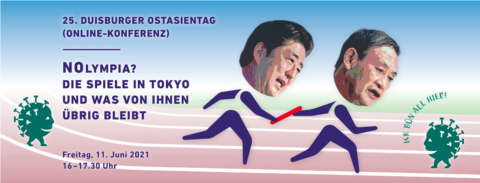 DIJ deputy director Barbara Holthus and principal researcher Torsten Weber will participate in this year’s online INEAST East Asia Day at Duisburg-Essen University on June 11. The event „NOlympia? The Tokyo Games and what remains of them“ will discuss the fate of the world’s biggest sports festival in times of a pandemic. Other participants are Katharina Bauernschmidt (Paracanoeist, Team Germany Paralympics) and Martin Fritz (Japan-based journalist and author). The event will be moderated by DIJ alumnus Axel Klein (Professor for Social Sciences of East Asia/Japanese Politics, Duisburg-Essen University). Details and registration here
DIJ deputy director Barbara Holthus and principal researcher Torsten Weber will participate in this year’s online INEAST East Asia Day at Duisburg-Essen University on June 11. The event „NOlympia? The Tokyo Games and what remains of them“ will discuss the fate of the world’s biggest sports festival in times of a pandemic. Other participants are Katharina Bauernschmidt (Paracanoeist, Team Germany Paralympics) and Martin Fritz (Japan-based journalist and author). The event will be moderated by DIJ alumnus Axel Klein (Professor for Social Sciences of East Asia/Japanese Politics, Duisburg-Essen University). Details and registration here
DIJ Web-Forum on Data and Values in Japan and Germany
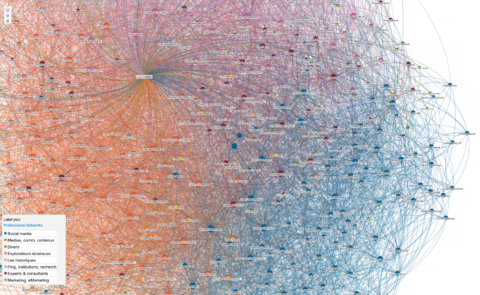
Data are widely considered to be the “oil” of the digital economy. But whereas the concept seems essential and ubiquitous, social, economic, and legal aspects associated with the meaning, ownership, exchange, use, and protection of data remain highly contested even among countries with similar economic and political systems like Japan and Germany. Our speakers will present the main legal regulations and public discourses related to the concept of data in Japan and Germany. In the discussion, we will try to pinpoint major differences in the understanding of data and their implications for the ownership, protection, use, and international exchange. Details and registration here
Speakers:
Axel v.d. Bussche, Taylor Wessing
Stefan Heumann, Stiftung Neue Verantwortung
Hitomi Iwase, Nishimura & Asahi
Koichi Sumikura , National Graduate Institute for Policy Studies (GRIPS)
moderated by Franz Waldenberger, German Institute for Japanese Studies
„You cannot not compare.“ Concluding contribution to Comparing Comparisons blog

In their concluding contribution to the Comparing Comparisons blog, DIJ director Franz Waldenberger and James D. Sidaway (Professor of Political Geography, NUS) emphasize the invaluable benefits from comparing as a method in the humanities and social sciences. „You can do it wrong or be seduced by too easy comparisons, but you cannot easily do without some“, they conclude. Their article „Who compares? The commodification and decolonization of comparison“ is the final contribution to the blog which originates from the international and interdisciplinary meeting by scholars affiliated with the Max Weber Foundation Research Group at the National University of Singapore and DIJ researchers in Tokyo in December 2019. Previous contributions offer variations of the blog’s theme and draw examples from the authors‘ respective areas of specialization, including anthropology, ethnography, Japanese studies, political geography, economics, cross-cultural studies, business and management research.
New on YouTube: Roundtable ‚Belt and Road Initiative as Method‘
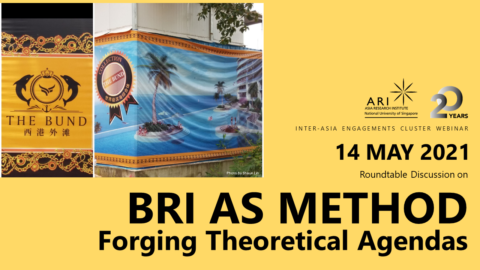
What are broader theoretical implications of China’s Belt and Road Initiative (BRI)? Members of the Max Weber Foundation Research Group on Borders, Mobility and New Infrastructures convened the Roundtable Discussion ‚BRI as Method: Forging Theoretical Agendas‘ to discuss the significance of China’s controversial project for the geography of knowledge production. A video of the event is now available on the DIJ’s YouTube channel, including links to the abstracts of the papers by the panelists Tim Bunnell, Yang Yang (both ARI), Darren Byler, Tim Oakes (both University of Colorado Boulder), Chong Ja Ian, and Woon Chih Yuan (both NUS). The panel was convened by Shaun Lin, Naoko Shimazu, and James D Sidaway. The research group, located at the NUS in Singapore, was founded in 2017 and is supported by the DIJ and the Max Weber Foundation. More information here.
Public talk ‚Tokyo Olympics – An Uphill Battle‘ with Barbara Holthus
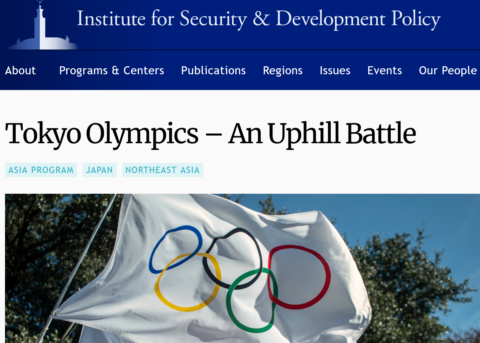
What are the latest developments and challenges that overshadow the Tokyo Olympics? Join DIJ deputy director Barbara Holthus, Olympic expert Vanessa Åsell Tsuruga, and special advisor to former Japanese Prime Minister Shinzo Abe, Tomohiko Taniguchi, for an online discussion of the risks and opportunities ahead and their impact on Tokyo and Japan. The event ‚Tokyo Olympics: An Uphill Battle‘ is hosted by the Japan Center at the Institute for Security & Development Policy (ISDP), a Stockholm-based non-profit and non-partisan research and policy organization. The webinar will be moderated by Jon Thunqvist, Senior Research Fellow at the ISDP, and takes place on Monday, 31 May, 10.00-11.00 (CEST) / 17.00-18.00 (JST). Registration is required via the ISDP.
„There is a great danger that the Olympics will become a superspreader event“
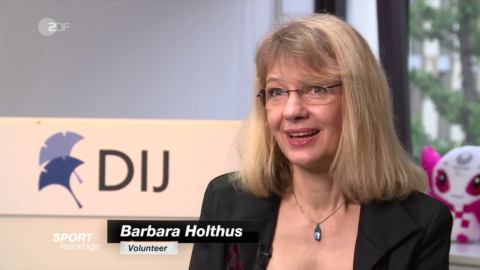
German TV ZDF visited the DIJ to interview deputy director Barbara Holthus about the increasing criticism of the Tokyo Olympics. „There is a danger of the Olympics becoming a superspreader event“, Barbara said. Her comments were broadcast in the ZDF Sport Reportage (23 May 2021) and can be viewed online. Barbara was also interviewed by German radio DLF about the potential cancellation of the Games. She said that she sees only a ten per cent chance for cancellation. „Monetary interests and the power of the IOC are too strong after all.“ In addition, Barbara’s recent interview with German news agency SID on Olympic volunteers can now be viewed on the DIJ’s YouTube channel. For more information on research related to the Olympics, see the DIJ’s special project on the Tokyo Olympics and the open access book publication Japan Through the Lens of the Tokyo Olympics.
First lecture of DIJ Method Talks series: Sakura Yamamura on Mental Mapping
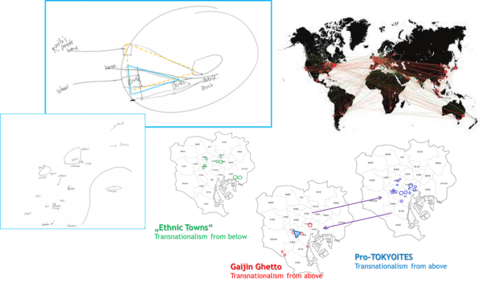
The diversification in and of urban spaces through rising mobility is inevitable, yet the actual capturing of socio-spatial urban transformation is still methodologically underexplored. Based on the analytical framework of Löw (2001), Sakura Yamamura employed the novel methodological tool of mental maps in her research on global and local mobility patterns. She combined it with 45 interviews with transnational migrant professionals in Tokyo, ethnographic site surveys and geographical mapping. The mental maps were drawn by transnational professional migrants in order to capture the extent and locations of urban transformations. In this presentation, she will introduce the method of mental mapping and discuss how it can be connected to spatial theory to capture socio-spatial transformations and mobility patterns in Tokyo and beyond. This lecture opens the new ‚DIJ Method Talks‘ lecture series. Details and registration here
Speaker:
Sakura Yamamura, Max Planck Institute for the Study of Religious and Ethnic Diversity








 Open Access
Open Access 
